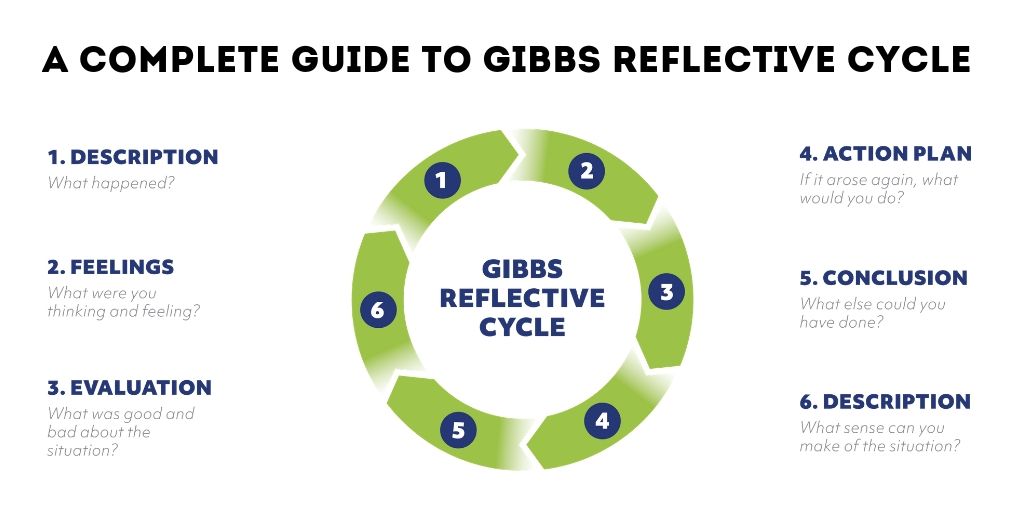How Gibbs Reflective Cycle Helps You Grow from Every Experience
Key Takeaways
Understanding Your Emotions: Recognize and manage feelings like frustration or excitement during tough situations, using these emotions as a chance for growth and learning from the experience.
Evaluating What Happened: Assess both the positives and negatives to learn from your experiences.
Applying What You’ve Learned: Use your reflections to improve future decisions, ensuring better outcomes next time.
Phases In Gibbs Reflective Cycle
Gibbs reflective cycle works best for both standalone situations and situations you encounter frequently.
This cycle, as discussed earlier, has six stages, which will help you think about an event, experience, or activity and make better decisions.
Let us walk through each phase with a Gibbs Reflective Cycle example.
Description
Stage one in Gibbs reflective cycle is the description. During this stage, you start by describing the situation or event before directly jumping to conclusions. So how can you achieve this? By asking yourself the below questions to understand the situation.
- What happened?
- Where did it happen?
- Who was involved?
- What was the outcome?
For example, let’s say you’re working on an important project. You divide the work among yourselves and assign it to each other. As the deadline approaches, you sit down to collate the work to have the final product. Now, it turns out not everything meets the client’s requirement, and there’s no time left out for reworks.
Feelings
This second phase of the cycle focuses on the feelings triggered in the event’s context or situation.
The entire purpose of this is not to judge or evaluate the feelings but to be aware of the experience. Now, this can be understood better with the following questions.
- What or how did you feel when the event took place?
- What did not go well?
- Were the contributions worth it?
- What do you at present think about the situation?
Now, coming back to the example, you realize you got many reworks to do in a brief span of time.
You’re very frustrated as this was not the outcome you were expecting. And finally, decide to work hard and complete the work and present it before the deadline.
You’re now content to have put in all the last-minute efforts.
Evaluation
This phase emphasizes judging the experience of the situation, whether it was good or bad. It also helps you analyze the approach that worked and the ones that did not work.
- Was the approach taken well?
- What was it that didn’t go well?
- Why did it not go well?
- What were your and other people’s contributions to the situation?
In our Gibbs reflective cycle example, teamwork was the approach that went well.
Each member of the team was available for the rework, which made the eventual target achievable. The approach that did not work was the lack of regular meet-ups to discuss the updates.
Learning From the Experience: Analysis
This phase focuses on the lessons learned from the event. With this, you can figure out how to deal with similar situations in the future.
- What can be inferred from the situation?
- What are the lessons learned from the event?
- Was the response to the situation apt?
As in the Gibbs reflective cycle example, the lack of rational planning and understanding of the requirement beforehand were the ones that lead to the disaster.
Conclusion
This is the phase where you can collate all the information from the previous phases and conclude how you would have acted in a better way. The following questions can help you in the same.
- What was the positive experience gained out of the event?
- What was the negative experience?
- How could you have done it differently?
We can figure out how proper planning before execution would’ve led to a fruitful outcome at a quicker pace from our example.
Action Plan
This is the phase where the entire purpose of the Gibbs Reflective Cycle is served.
Here is where you figure out how you will act upon any similar situation in the future. This is where you carefully plan the action points for the next similar situation.
In our example, the next time you get to work as a team on any requirement, it is imperative that you catch up with the teammates at regular intervals and get a glimpse of the final product.
Learning From the Experience: Final Thoughts
As we have seen, the Gibbs Reflective Cycle, with an example, is now your turn to draw the best lessons from all the experiences and work on them.





















